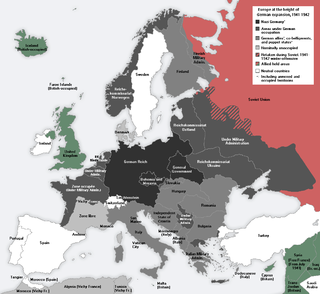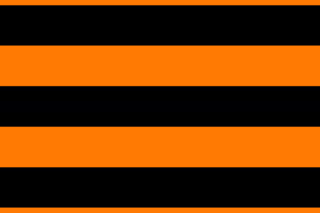
Sergey Leonidovich Sokolov was a Soviet military commander, Hero of the Soviet Union, and served as Minister of Defence of the Soviet Union from 22 December 1984 until 30 May 1987.

Vasiliy Ivanovich Petrov was a senior Russian military official and Marshal of the Soviet Union.

Ivan Vladimirovich Tyulenev was a Soviet military commander, one of the first to be promoted to the rank of General of the Army in 1940.

Elina Avraamovna Bystritskaya is a Soviet and Russian actress best known for her role of Axinia in Sergei Gerasimov's epic screening of Mikhail Sholokhov's novel And Quiet Flows the Don (1958).

Colonel Ilya Grigoryevich Starinov was a Soviet military officer.
Vasily Maximovich Afonin was a Soviet air ace who fought in the German-Soviet War.
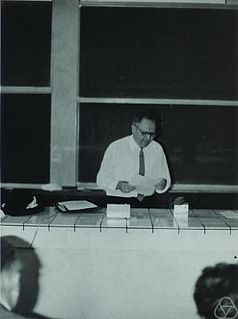
Vasily Sergeyevich Vladimirov was a Soviet mathematician and mathematical physicist working in the fields of number theory, mathematical physics, quantum field theory, numerical analysis, generalized functions, several complex variables, p-adic analysis, multidimensional tauberian theorems.
Vasily Mikhaylovich Badanov was a Soviet military officer and general, best known for his leadership in the Tatsinskaya Raid (1942) and subsequent command of the 4th Tank Army (1943–1944).

Vasily Ivanovich Kazakov was a Soviet Marshal of the artillery.
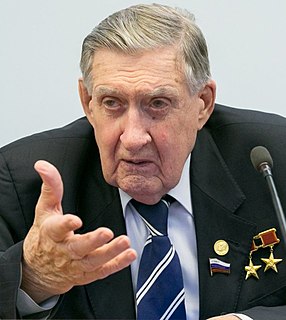
Vladimir Ivanovich Dolgikh is a Russian politician who was head of the Metallurgical Department of the Central Committee Secretariat of the Communist Party of the Soviet Union. He was a candidate member (non-voting) of the Politburo from 1982 to 1988.

Ekaterina Illarionovna Mikhailova-Demina is the only woman who served in front-line reconnaissance in the Soviet marines during World War II.

Ivan Fedorovich Ladyga was a Soviet-Russian colonel of artillery. He was a Candidate of Military Sciences, a professor, and a corresponding member of the Russian Military Sciences Academy. He was given the award of Honoured Worker of Higher Education of the Russian Federation, and a veteran of World War II Ladyga was one of the authors of the Soviet doctrine for using Strategic Missile Troops in combat. Born in 1920 in the village Manuylivka, USSR.

The Jubilee Medal "60 Years of Victory in the Great Patriotic War 1941–1945" is a state commemorative medal of the Russian Federation created to denote the 60th anniversary of the 1945 victory over Nazi Germany. It was established on February 28, 2004 by Presidential Decree № 277.
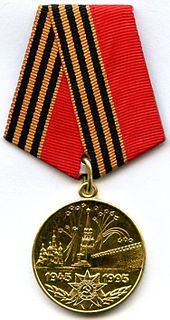
The Jubilee Medal "50 Years of Victory in the Great Patriotic War 1941–1945" is a state commemorative medal of the Russian Federation created to denote the 50th anniversary of the 1945 victory over Nazi Germany. It was established on July 7, 1993 by the Law of the Russian Federation № 5336-1. It was also established in Ukraine, in Kazakhstan by Decision of the Supreme Council of the Republic of Kazakhstan № 2485-XII of October 26, 1993, and in the Republic of Belarus on the basis of Presidential Decree № 102 of March 14, 1995.

The Jubilee Medal "Twenty Years of Victory in the Great Patriotic War 1941–1945" was a state commemorative medal of the Soviet Union established on May 7, 1965 by decree of the Presidium of the Supreme Soviet of the USSR to denote the twentieth anniversary of the Soviet victory over Nazi Germany in World War II.

The Jubilee Medal "Thirty Years of Victory in the Great Patriotic War 1941–1945" was a state commemorative medal of the Soviet Union established on April 25, 1975 by decree of the Presidium of the Supreme Soviet of the USSR to denote the thirtieth anniversary of the Soviet victory over Nazi Germany in World War II.

The Jubilee Medal "Forty Years of Victory in the Great Patriotic War 1941–1945" was a state commemorative medal of the Soviet Union established on April 12, 1985 by decree of the Presidium of the Supreme Soviet of the USSR to denote the fortieth anniversary of the Soviet victory over Nazi Germany in World War II.

The Medal "For the Capture of Vienna" was a World War II campaign medal of the Soviet Union established on June 9, 1945 by decree of the Presidium of the Supreme Soviet of the USSR to satisfy the petition of the People's Commissariat for Defense of the Soviet Union to reward the participants of the battles for the capture of the city of Vienna from the armed forces of Nazi Germany. The medal's statute was amended on July 18, 1980 by decree of the Presidium of the Supreme Soviet of the USSR № 2523-X.

The Jubilee Medal "70 Years of Victory in the Great Patriotic War 1941–1945" is a state commemorative medal of the Russian Federation. It was established on December 21, 2013 by Presidential Decree № 931 to denote the 70th anniversary of the 1945 victory over Nazi Germany. Its award criteria were later ratified by presidential decree № 175-rp of June 4, 2014.





